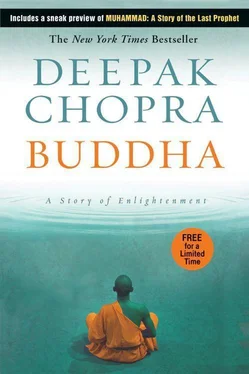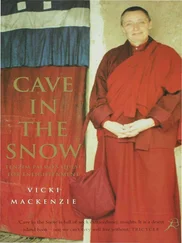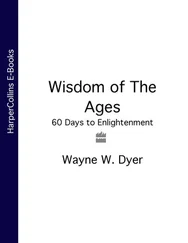“Tell me one thing,” said Buddha. “Why does Angulimala kill so many people?”
“To save himself,” the old priest replied. “The disgraced boy took to the woods. He began to live like an animal. He ate roots and insects and covered his body with hides. They say by chance he met a wandering fortune-teller, who told him the curse could be lifted only by collecting a thousand fingers and offering them as sacrifice to Shiva. That’s why he wears his terrible necklace.”
“Then I must help him,” said Buddha. “Otherwise Angulimala will show up here one day to sacrifice his necklace on your altar.”
The old priest shuddered visibly and then slammed the gate shut behind him.
THOUGHTS OF ANGULIMALA stayed in Buddha’s mind that day and the next morning. Why was he drawn to the monster?
He walked deeper into the jungle to face the question. It was a blazing afternoon when Buddha found himself on a hidden trail through the jungle. There was a rustle, then before he could turn his head, a wild beast jumped down from the trees and crouched before him. The covering of matted hides made Angulimala look like a giant ferocious ape baring its fangs.
Buddha regarded the wild man’s teeth, which had been crudely filed to a point, and his necklace of withered fingers. In his left hand he carried a long curved blade. “Namaste,” said Buddha. Angulimala growled.
“I cannot save you unless you tell me how you are suffering,” said Buddha. “An animal doesn’t need saving.”
The wild man showed no reaction. He could reach his prey in one leap, so he raised his knife and with a howl sprang toward Buddha. When he came to earth, however, his knife slashed at empty air. Buddha was standing, as before, two paces away. Angulimala looked bewildered.
“You do not have to ask for mercy or forgiveness,” said Buddha. “Speak your real name, not the monster’s that you have assumed.”
The wild man took another leap at Buddha, and as before, when he landed his blade swished through the air. Buddha was standing two paces away.
“I can only stop a moment,” Buddha said. “But if you want my help, come to me.”
He turned his back on Angulimala and began slowly walking away. Behind him there was a scream of rage. One thing the old Brahmin had said was true: Angulimala possessed enough demonic energy that he could outrun a horse. He charged at Buddha, his knife stretched out in front like a spear. It should have taken only a few seconds to reach his prey, but Buddha remained a step ahead. Angulimala sped up, panting as he ran. His bare feet stirred up a cloud of dust, but he couldn’t close the gap between himself and Buddha. This kept up for ten minutes, until the wild man fell to the ground, clutching at his cramped legs. Buddha turned around and regarded him.
“There’s a small distance between you and me,” he said mildly. “Shall I close it? I can.”
He reached down and touched the killer’s matted hair, and Angulimala began to weep. “Please tell me your real name,” Buddha urged. There was a pause, and Angulimala shivered from head to toe. “Why?” he moaned. By this he meant, Why should anyone help me? I am damned.
“I will tell you, but I can’t explain to an animal,” said Buddha.
Angulimala clutched at himself, writhing on the ground. Buddha stood quietly, letting the demonic energy drain away. It would take more than a single seizure to purify the wild man, but this was a beginning. After he had thrashed in the dust for some minutes, a name came out. “Anigha,” he said.
“Look at me, Anigha,” Buddha said. “We are brothers.”
The wild man was pacified from exhaustion, his body spent. He raised his head as Buddha bent over to bless him. “You were once a great saint,” said Buddha. “Now you have become a great sinner. This was not a curse. The cycle of birth and rebirth has brought you full circle. The same thing happens to everyone. It has happened to me.”
Each word he spoke caused a change in Anigha. His eyes looked far away; he seemed to remember something deep and profound. Tears rolled down his cheeks. “I am damned,” he said aloud, his voice becoming more human.
“No, you share the same fate as everyone,” said Buddha. “You wanted to find a way out of suffering. The only difference is that you asked for the life of a monster. You imagined that if you caused enormous suffering, you would be immune to it.”
The weight of Anigha’s crimes was crushing him-he groaned.
“It’s horrible to bring hell on earth,” said Budddha. “There was another purpose, though, that no one sees.” Anigha stared in bafflement. “You hungered for the supreme truth many lifetimes ago. The gods failed you; your vows as a monk led to nothing but deeper disappointment. So you swore that you would not be redeemed unless the greatest sinner received the same treatment.”
Now Anigha grasped Buddha’s feet and was sobbing loudly as his pain poured out. Buddha took his hands away and lifted him up. “If you are part of me, you need nothing else to be saved,” he said.
Anigha said, “But I have killed.”
“You fell into evil so that you could prove to yourself that there is a reality that evil cannot touch. Will you let me show it to you?”
Anigha listened quietly, then he looked down at his filthy body clothed in bloodied hides. They were unrecognizable now as part of him. He led Buddha to a stream and washed the dirt away. When he had washed off as much as he could, he came out of the water. “I will follow you anywhere,” he said. “Angulimala is dead.”
“You will always be with me. But for the moment you need to stay here,” said Buddha. “Devote yourself to atonement. Leave food for the poor. Offer flowers and water at the temple gate for those who want to make sacrifice. Help lost travelers whom you once terrified. Whatever you do, don’t show yourself. I will return for you very soon.”
Anigha didn’t find it easy to let Buddha go; he still half-believed that he was in a dream devised by a mischievous demon. After a while, though, his exhaustion made him nod off as the two sat under a tree talking. Buddha arose and left quietly. He gave no thought to where he was going next. But something had happened that he alone knew. He had altered the course of evil with a touch and a word.
He was still a new Buddha, four days out of the womb, but every moment was bringing him greater power and more wisdom to use it well.
The five monks had retreated to a forest glade near Benares after they parted from Gautama. Months passed. Now the glade was beautiful with overhanging trees in the riotous bloom of spring. They knew Gautama must be dead, although the subject was never raised. The five monks lived a secluded life, but their time of extreme austerity was over and done with.
Returning to a moderate life seemed sensible, but a faint gloom settled over their existence because every forest monk wanted to reach enlightenment. Gautama’s failure spelled failure for them too. Therefore, when he walked into their camp one morning, the five monks were relieved for themselves as much as for him.
After they greeted him with exclamations and expressed their joy, the monks sat and waited for their brother to describe what had happened. It was as if someone had returned from the dead. They expected a miracle story. At the very least, he would describe the wonders of enlightenment. But Buddha only wanted to be with them quietly, his glance occasionally moving from one to the other.
“We mourned for you, Gautama,” Kondana, the youngest, said.
“Because you knew that Gautama was no more,” said Buddha. “And you were right.”
This was something they understood since it’s a matter of course that someone who reaches enlightenment has severed all connections to his former personality. But none of the five monks had actually met anyone who had gotten there.
Читать дальше












